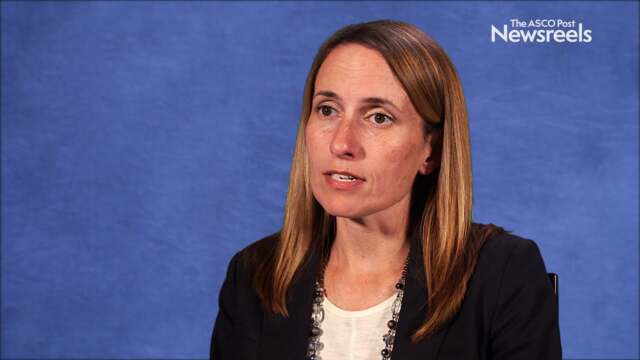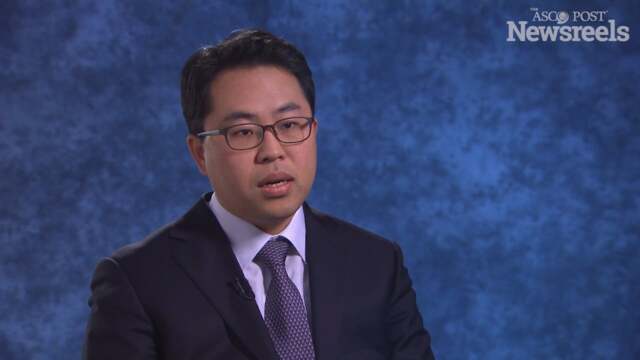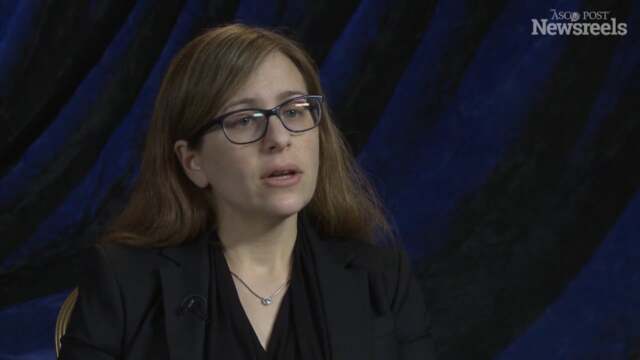Cabozantinib Prolongs Progression-Free Survival in Previously Treated Radioiodine-Refractory Differentiated Thyroid Cancer
As reported in The Lancet Oncology by Marcia S. Brose, MD, Abramson Cancer Center, University of Pennsylvania, and colleagues, the phase III COSMIC-311 trial has shown that cabozantinib produced a numerically higher objective response rate and significantly prolonged progression-free survival vs...
FDA Approves Cabozantinib for Patients With Previously Treated Radioactive Iodine–Refractory Differentiated Thyroid Cancer
On September 17, the U.S. Food and Drug Administration (FDA) approved cabozantinib (Cabometyx) for the treatment of adult and pediatric patients aged 12 years and older with locally advanced or metastatic differentiated thyroid cancer that has progressed following prior vascular endothelial growth...
FDA Pipeline: Reviews for Agents in Lung Cancer, Thyroid Cancer, Kidney Cancer, and More
Recently, the U.S. Food and Drug Administration (FDA) accepted applications for agents aiming to treat non–small cell lung cancer (NSCLC), differentiated thyroid cancer, renal cell carcinoma (RCC), hypersensitive acute lymphoblastic leukemia (ALL), mucosal melanoma, and endometrial carcinoma....
Expert Point of View: Nicole Chau, MD
ASCO discussant Nicole Chau, MD, Clinical Associate Professor at the University of British Columbia/BC Cancer in Vancouver, said the COSMIC-311 trial was “noteworthy for meeting its co-primary endpoint of progression-free survival (hazard ratio = 0.22) in this heavily pretreated patient...
Cabozantinib: Potential New Option for Treatment-Refractory Thyroid Cancer
The tyrosine kinase inhibitor cabozantinib appears to be an effective new option for treatment-refractory differentiated thyroid cancer, according to the phase III COSMIC-311 trial, which was stopped early for efficacy.1 COSMIC-311 is the first randomized placebo-controlled trial to evaluate the...
Cabozantinib in Previously Treated, Radioiodine-Refractory Differentiated Thyroid Cancer: COSMIC-311
As reported in The Lancet Oncology by Marcia S. Brose, MD, and colleagues, the phase III COSMIC-311 trial has shown that cabozantinib produced a numerically higher objective response rate and significantly prolonged progression-free survival vs placebo in patients with previously treated,...
Receptor Tyrosine Kinase Inhibitor Lenvatinib for Anaplastic Thyroid Cancer
As reported in the Journal of Clinical Oncology by Lori J. Wirth, MD, and colleagues, a phase II trial of lenvatinib in patients with anaplastic thyroid cancer was stopped for futility after an interim analysis. Study Details In the international multicenter trial, 34 patients received lenvatinib...
Lori J. Wirth, MD, on Advanced Thyroid Carcinoma: Evolving Systemic Therapy Options
Lori J. Wirth, MD, of Massachusetts General Hospital Cancer Center, discusses the common molecular alterations across thyroid cancer subtypes; targeted treatments for BRAF V600E–mutant, NTRK–fusion positive, and RET–altered disease; and optimal therapies for patients with multiple types of thyroid cancer.
FDA Pipeline: Designations in Ovarian, Head/Neck, and Thyroid Cancers
Recently, the U.S. Food and Drug Administration (FDA) granted Fast Track designation to a novel immunotherapy for the treatment of ovarian cancer as well as Breakthrough Therapy designation to treatments for HRAS-mutant head and neck squamous cell carcinoma and previously treated thyroid cancer....
Study Links Exposure to Nighttime Artificial Lights With Possible Elevated Risk of Thyroid Cancer
People living in regions with high levels of outdoor artificial light at night may face a higher risk of developing thyroid cancer, according to a study published by Zhang et al in the journal Cancer. Link Between Nighttime Light and Cancer Risk Over the past century, nightscapes—especially in...
FDA Approves Pralsetinib for RET-Altered Thyroid Cancers
On December 1, the U.S. Food and Drug Administration (FDA) approved pralsetinib (Gavreto) for adult and pediatric patients 12 years of age and older with advanced or metastatic RET-mutant medullary thyroid cancer who require systemic therapy, or for patients with RET fusion–positive thyroid cancer...
Phase II Study Investigates Efficacy of Anlotinib in Radioiodine-Refractory Differentiated Thyroid Cancer
Patients with locally advanced or metastatic radioiodine-refractory differentiated thyroid carcinoma demonstrated a statistically significant progression-free survival benefit when treated with anlotinib, a novel tyrosine kinase inhibitor, vs placebo, as well as higher response rates, according to...
Pralsetinib in RET-Mutated Medullary Thyroid Cancer
Pralsetinib (also known as BLU-667) showed activity in patients with advanced RET mutation–positive medullary thyroid cancer, including high rates of durable response, disease control, and 18-month progression-free survival. These findings were presented by Hu et al at the ESMO Virtual Congress...
RET Inhibitor Selpercatinib Achieves Durable Responses in Majority of Patients With RET Gene Fusions
For patients with non–small cell lung cancers (NSCLC) marked by RET gene fusions, the targeted therapy selpercatinib was well tolerated and achieved durable objective responses in the majority of participants in the phase I/II LIBRETTO-001 trial, according to researchers from The University of...
Changes in Overall Survival in Patients With Anaplastic Thyroid Carcinoma From 2000–2019
In a single-institution retrospective cohort study reported in JAMA Oncology, Maniakas et al found that overall survival in anaplastic thyroid carcinoma has improved in recent years and identified treatment factors associated with this improvement. As stated by the investigators, “Anaplastic...
Post Hoc Analysis of Outcomes With Vandetanib for Progressive and Symptomatic Medullary Thyroid Cancer
As reported in the Journal of Clinical Oncology by Kreissl et al, a post hoc analysis of outcomes in the pivotal phase III ZETA trial has shown significantly improved progression-free survival with the multikinase inhibitor vandetanib vs placebo in a subgroup of patients with progressive and...
Study Finds a High Rate of Intra- and Postoperative Conversions to Total Thyroidectomy
The overall risk of needing a total thyroidectomy was found to be 19.4% for patients undergoing lobectomy for indeterminate and high-risk thyroid nodule, according to a report published by Moore et al in the World Journal of Surgery. The study also found that 21% and 26.5% of patients originally...
Spartalizumab for Locally Advanced or Metastatic Anaplastic Thyroid Carcinoma
In a phase II study reported in the Journal of Clinical Oncology, Jaume Capdevila, MD, and colleagues found that the programmed cell death protein 1 (PD-1) inhibitor spartalizumab produced responses in a cohort of patients with locally advanced or metastatic anaplastic thyroid carcinoma, with all...
FDA Approves Selpercatinib for Lung and Thyroid Cancers With RET Mutations or Fusions
On May 8, 2020, the U.S. Food and Drug Administration (FDA) granted accelerated approval to selpercatinib (Retevmo) for the following indications: Adult patients with metastatic RET fusion–positive non–small cell lung cancer (NSCLC) Adult and pediatric patients ≥ 12 years of age with advanced or...
FDA Pipeline: Priority Review Granted for Treatment in Lung and Thyroid Cancers
This week, the U.S. Food and Drug Administration (FDA) granted Priority Review to a treatment for lung and thyroid cancers with a RET fusion or mutation; gave Breakthrough Therapy designation to a doublet therapy for TP53-mutated myelodysplastic syndromes; and issued an update to their...
Cancer Incidence in World Trade Center Responders to the September 11 Attacks
A study published by Shapiro et al in JNCI Cancer Spectrum showed that responders to the World Trade Center site after the attacks on September 11, 2001, have statistically significant elevations in cancer incidence for all cancer sites combined, and for prostate and thyroid cancer and leukemia....
DUOX2 Mutation in Familial Thyroid Cancers
Researchers have identified a new genetic mutation that may cause a type of familial thyroid cancer. According to the researchers, DUOX2 is the first and only mutation associated with familial thyroid cancer to be identified in a gene that is primarily expressed in the thyroid gland. These findings ...
ESMO Congress 2019: Quick Takes From Key Clinical Trials
The ESMO Congress continues to grow as a pivotal platform for research in clinical oncology. At the ESMO Congress 2019, important findings were showcased in more than 2,200 studies, including 93 late-breaking abstracts. The ASCO Post summarized much of that news in separate articles over several...
2019 Annual Meeting of the American Thyroid Association Briefs
The American Thyroid Association held its 2019 Annual Meeting from October 30 to November 3 in Chicago. Below are brief summaries of important oral presentations on thyroid cancer from the meeting. Incidence and Incidence-Based Mortality in a State Results of a retrospective analysis of thyroid...
ESMO 2019: LIBRETTO-001 Trial of Selpercatinib in RET Fusion–Positive Thyroid Cancer
Patients with advanced RET fusion–positive thyroid cancer and RET-mutant medullary thyroid cancer had high rates of response following treatment with selpercatinib, according to findings from the phase I/II LIBRETTO-001 trial presented by Wirth et al at the European Society for Medical Oncology...
For Maria Papaleontiou, MD, Research Holds the Key to Improving Care of Patients With Thyroid Cancer
Maria Papaleontiou, MD, whose research interests focus on the complex issues surrounding the management of thyroid cancer and thyroid disease in general, was born on Cyprus, a small island nestled in the azure waters of the Mediterranean Sea. She recently spoke with The ASCO Post about her life and ...
Lauren P. Wallner, PhD, MPH, on Thyroid Cancer: Reducing Overtreatment With Radioactive Iodine
Lauren P. Wallner, PhD, MPH, of the University of Michigan, discusses her findings from a population-based study, which showed that many patients believe they had no choice about whether or not to receive radioactive iodine, even though it often does not improve survival. There is a need, she says, for better shared decision-making (Abstract 159).
News From JCO and JOP
STAYING UP-TO-DATE in the fast-paced world of oncology literature is a daunting task at best. To assist with that task, The ASCO Post has assembled an assortment of studies recently published in the Journal of Clinical Oncology (JCO) and the Journal of Oncology Practice (JOP). Future installments...
The Rising Incidence of Thyroid Cancer Reconsidered
Despite a significant rise in the incidence of thyroid cancer, the U.S. Preventive Services Task Force (USPSTF), a panel of independent experts in primary care and screening, has given thyroid cancer screening a D recommendation, which is a recommendation against screening. To shed light on this...
Bridging the Survivorship Care Gap for Young Adult Survivors of Thyroid Cancer
Although thyroid cancer is among the five most common carcinomas diagnosed in adolescents and young adults (AYAs) between the ages of 15 and 39—thyroid cancer is more common in young women than young men and is the most common cancer diagnosed in females between the ages of 15 and 29 and the second ...
U.S. Preventive Services Task Force Recommends Against Screening for Thyroid Cancer in Asymptomatic Individuals
AS REPORTED in JAMA, the U.S. Preventive Services Task Force (USPSTF) has recommended against thyroid cancer screening in asymptomatic individuals.1 The current USPSTF statement is an update of a 1996 USPSTF recommendation statement. The recommendation was based on Task Force review of evidence on ...
Are Thyroid Cancer Incidence and Mortality Rates Truly Increasing in the United States?
THYROID CANCER diagnoses are increasing at a rate faster than any other malignancy in the United States. In 2017, there will be 56,870 new cases, accounting for 3.4% of all cancers, and 2,010 people will die of thyroid cancer.1 This represents a more than 200% increase in incidence since the...
Trends in Thyroid Cancer Incidence and Mortality in the United States
THE REPORTED INCIDENCE of thyroid cancer has markedly increased in the United States in recent decades, largely reflecting an increase in reported rates of papillary thyroid cancer. It has been unclear whether the increase in incidence is reflected in mortality rates over time. In a study of...
Dong Wook Shin, MD, DrPH, MBA, on Thyroid Cancer: Risk of Side Effects
Dong Wook Shin, MD, DrPH, MBA, of Seoul National University Cancer Hospital, discusses the risk of coronary heart disease and ischemic stroke in patients with thyroid cancer taking levothyroxine (Abstract 105).
I’ve Survived Two Cancers
In 2012, my husband, Robert, and I were looking forward to starting the next phase of our lives and were feeling excited about the future. Although only in our 50s, we had decided to retire early from our full-time careers, move to our cabin in Hayward, Wisconsin, and find less stressful part-time ...
FDA Grants Selumetinib Orphan Drug Designation for Adjuvant Treatment of Differentiated Thyroid Cancer
Earlier this month, AstraZeneca announced that the U.S. Food and Drug Administration (FDA) has granted Orphan Drug designation for the investigational MEK1/2 inhibitor selumetinib for adjuvant treatment of patients with stage III or IV differentiated thyroid cancer. Selumetinib inhibits the MEK...
Raising Awareness of Medullary Thyroid Carcinoma
I’m used to having bumps and cysts pop up on my body, so when I felt a lump on the front of my throat, just below my Adam’s apple, I brushed it off. But when it was still there 6 months later, I became concerned and decided to see an ear, nose, and throat specialist. He performed a fine-needle...
Detection of Thyroid Cancer Most Cost-Effective With Physical Examination, Not Ultrasound Screening
A study evaluating annual physical examination as a screening method to detect thyroid cancer in cancer survivors exposed to neck radiation has shown a substantial cost reduction compared with ultrasound screening, with no thyroid cancer–related mortality.1 According to the analysis, this method...
Dana Barnea, MD, on Screening Survivors for Thyroid Cancer
Dana Barnea, MD, of Memorial Sloan Kettering Cancer Center, discusses data that suggest annual palpation of the thyroid is an adequate and safe means of screening childhood and young adult cancer survivors, a population at high risk for this type of cancer (Abstract 254).
Wide Variation in Use of Radioactive Iodine for Thyroid Cancer
The proportion of patients with well-differentiated thyroid cancer who received radioactive iodine following total thyroidectomy increased significantly since 1990, and there is wide variation in the use of adjuvant radioactive iodine, according to a study in the Journal of the American Medical...
Oncology Research a Strong Presence at the American College of Surgeons Meeting: New Data in Pancreatic, Rectal, Thyroid, and Breast Cancers
Research in cancer staging, surgical procedures, outcomes, and medical treatment was included among the 2,000 abstracts presented at the 97th Annual American College of Surgeons Clinical Congress in San Francisco. The ASCO Post was there to capture the latest findings. Neoadjuvant Chemotherapy in...
Vandetanib Demonstrates Therapeutic Efficacy in Patients with Advanced Medullary Thyroid Cancer
A phase III trial among patients with locally advanced or metastatic medullary thyroid cancer met its primary objective of progression-free survival prolongation among patients receiving vandetanib compared to placebo. The secondary efficacy endpoints of objective response rate, disease control...
Vandetanib: New Drug for Unresectable Medullary Thyroid Cancer
In the Clinic provides overviews of novel oncology agents, addressing indications, mechanisms, administration recommendations, safety profiles, and other essential information needed for the appropriate clinical use of these drugs. Indication The oral kinase inhibitor vandetanib (Caprelsa) was...
Low-dose Radioiodine as Effective as High-dose in Thyroid Ablation
Two studies in The New England Journal of Medicine found that low-dose radioiodine is as effective as a high-dose strategy in treating patients with thyroid cancer and that recombinant human thyrotropin (thyrotropin alfa [Thyrogen]) and thyroid hormone withdrawal had similar efficacy in preparing...
Obese Patients at Higher Risk of Aggressive Thyroid Tumors
Obese patients present with more advanced and more aggressive forms of papillary thyroid cancer and should be screened for thyroid cancer with sonography, which is more sensitive in detecting thyroid cancer than physical examination alone, according to a study published online in the Archives of...
Cabozantinib Prolongs Progression-free Survival in Advanced Medullary Thyroid Cancer
Cabozantinib prolonged progression-free survival in patients with unresectable, locally advanced, or metastatic medullary thyroid cancer with documented disease progression in the phase III EXAM trial. Based on these results, Exelixis submitted a New Drug Application to the FDA in May 2012. The...
Molecularly Targeted Treatment of Thyroid Cancer Rapidly Evolving
Recent advances in understanding the pathogenesis and altered signaling pathways in thyroid cancer are improving treatment options for this malignancy, especially for the subset of patients with medullary thyroid cancer and those with differentiated thyroid cancer that has metastasized, according...
Differentiated Thyroid Cancer: Who, When, and How to Treat?
Differentiated thyroid cancer—papillary, follicular, and Hürthle cell carcinomas—has historically been managed by endocrinologists, surgeons, and radiation oncologists, but recent progress in the field has led to greater involvement by medical oncologists, especially in the care of patients with...
Cabozantinib Approved for Treatment of Progressive Metastatic Medullary Thyroid Cancer
The FDA recently approved cabozantinib (Cometriq), for the treatment of patients with progressive metastatic medullary thyroid cancer. Cabozantinib is a small molecule that inhibits the activity of multiple tyrosine kinases, including RET, MET, and VEGF receptor 2. The approval was based on the...
Cabozantinib in Metastatic Medullary Thyroid Cancer
In the Clinic provides overviews of novel oncology agents, addressing indications, mechanisms, administration recommendations, safety profiles, and other essential information needed for the appropriate clinical use of these drugs. Indication On November 29, 2012, cabozantinib (Cometriq) was...




